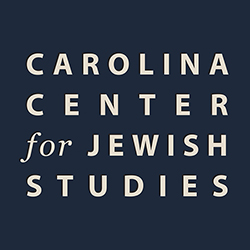Press Announcement, April 4, 2003
The University of North Carolina at Chapel Hill has established a new interdisciplinary research and teaching center to explore Jewish history, culture and religion in the United States and abroad.
“The Carolina Center for Jewish Studies will provide a scholarly understanding of Judaism and the historic Jewish experience,” said Chancellor James Moeser. “We are excited about this interdisciplinary opportunity to build on the strengths of faculty members in many departments.”
Judaism and Judaica have been studied at Carolina since 1947, when the department of religious studies was established. Until recently, most courses focused on the study of biblical sources and Hebrew languages. The new center brings together scholars from a range of academic departments including English, Germanic Languages, History, Political Science, Religious Studies and Slavic Languages and Literatures.
“Carolina was one of the first major public universities to offer courses in Judaism more than 50 years ago,” said Risa Palm, [former] dean of the College of Arts and Sciences, where the new center is based. “It’s appropriate that we build on that leadership now by drawing on our faculty expertise in key areas concerning the Jewish experience throughout history.”
The center has a three-fold mission: to teach undergraduate and graduate courses, create and disseminate new research, and convene public conferences and lectures featuring leading scholars of the Jewish experience in the United States, Europe, Israel and beyond. An important first step occurred in late March,when university officials approved a new undergraduate minor in Jewish studies to begin this fall.
Plans call for an undergraduate major program in the near future.
The center will provide for the study of the culture, history and religion of the Jewish peoples in interaction with the wider community in which they live, said Jonathan Hartlyn, center director and professor and chair of the department of political science. “Our program will provide rich knowledge of the Jewish experience reaching back to early Judaism. There will be attention to the modern Jewish experience in Europe and the United States, including the American South, as well as in other world regions.”
Hartlyn also said that attention would be paid to a comparative analysis of Jewish political and economic life, educational and cultural expression and demographic trends, to the Zionist movement, and to the history of modern Israel in its regional context. The curriculum for the new undergraduate minor consists of five courses — including at least one at the advanced level)– that must be taken in at least two different departments. Students in the minor will be required to take two core courses, which provide a comprehensive introduction to early Judaism and modern Judaism. They wil fulfill their other requirements by selecting from a wide range of courses offered in varied academic departments in the arts, humanities and social sciences.
As part of the university’s Carolina First campaign, the center is seeking funds to support additional faculty, research, course offerings, fellowships and public programs.
The center held its first advisory board meeting in February. Members of the board include alumni, attorneys, business executives and Jewish community leaders.
